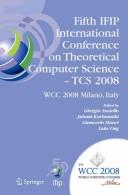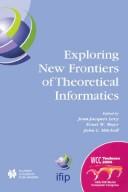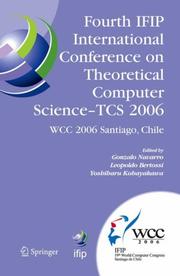| Listing 1 - 4 of 4 |
Sort by
|

ISBN: 0387096809 3540096809 0387096795 3642813917 3642813895 Year: 2008 Volume: 15 Publisher: New York, NY : Springer US : Imprint: Springer,
Abstract | Keywords | Export | Availability | Bookmark
 Loading...
Loading...Choose an application
- Reference Manager
- EndNote
- RefWorks (Direct export to RefWorks)
International Federation for Information Processing The IFIP series publishes state-of-the-art results in the sciences and technologies of information and communication. The scope of the series includes: foundations of computer science; software theory and practice; education; computer applications in technology; communication systems; systems modeling and optimization; information systems; computers and society; computer systems technology; security and protection in information processing systems; artificial intelligence; and human-computer interaction. Proceedings and post-proceedings of refereed international conferences in computer science and interdisciplinary fields are featured. These results often precede journal publication and represent the most current research. The principal aim of the IFIP series is to encourage education and the dissemination and exchange of information about all aspects of computing. For more information about the 300 other books in the IFIP series, please visit www.springer.com. For more information about IFIP, please visit www.ifip.org. .
Computer science --- Computer networks --- Artificial intelligence --- Lactation --- Mammary glands --- Physiology, Comparative --- Prolactin --- 591.146 --- 591.147 --- 591.146 Secretions of the mammary glands. Milk. Lactation --- Secretions of the mammary glands. Milk. Lactation --- 591.147 Internal secretions. Endocrine secretions. Hormones. Adrenalin. Insulin. Sex hormones. Androgens. Oestrogens --- Internal secretions. Endocrine secretions. Hormones. Adrenalin. Insulin. Sex hormones. Androgens. Oestrogens --- Galactin --- Galactopoietic hormone --- Lactogenic hormones --- Luteotropin --- Mammotropin --- Gonadotropin --- Pituitary hormones --- Protein hormones --- Comparative physiology --- Medicine, Comparative --- Zoology --- Breast --- Exocrine glands --- Udder --- Regulation of lactation --- Biological control systems --- Regulation --- Growth --- Hormones --- Lactation. --- Physiology. --- Computer industry. --- History. --- Information theory. --- Computer science. --- The Computer Industry. --- History of Science. --- Theory of Computation. --- The Computing Profession. --- History of Computing. --- Informatics --- Science --- Communication theory --- Communication --- Cybernetics --- Annals --- Auxiliary sciences of history --- Electronic industries --- Computers. --- Automatic computers --- Automatic data processors --- Computer hardware --- Computing machines (Computers) --- Electronic brains --- Electronic calculating-machines --- Electronic computers --- Hardware, Computer --- Computer systems --- Machine theory --- Calculators --- Cyberspace --- Pathology --- Philosophy. --- Disease (Pathology) --- Medical sciences --- Diseases --- Medicine --- Medicine, Preventive --- Professions. --- Computers --- Career patterns --- Careers --- Jobs --- Professional services --- Occupations --- Interprofessional relations --- Vocational guidance

ISBN: 1280462280 9786610462285 1402081413 1402081405 Year: 2004 Publisher: New York, NY : Springer US : Imprint: Springer,
Abstract | Keywords | Export | Availability | Bookmark
 Loading...
Loading...Choose an application
- Reference Manager
- EndNote
- RefWorks (Direct export to RefWorks)
Exploring New Frontiers of Theoretical Informatics Edited by Jean-Jacques Levy, Ernst W. Mayr, and John C. Mitchell In recent years, IT application scenarios have evolved in very innovative ways. Highly distributed networks have now become a common platform for large-scale distributed programming, high bandwidth communications are inexpensive and widespread, and most of our work tools are equipped with processors enabling us to perform a multitude of tasks. In addition, mobile computing (referring specifically to wireless devices and, more broadly, to dynamically configured systems) has made it possible to exploit interaction in novel ways. To harness the flexibility and power of these rapidly evolving, interactive systems, there is need of radically new foundational ideas and principles; there is need to develop the theoretical foundations required to design these systems and to cope with the many complex issues involved in their construction; and there is need to develop effective principles for building and analyzing such systems. Reflecting the diverse and wide spectrum of topics and interests within the theoretical computer science community, Exploring New Frontiers of Theoretical Informatics is presented in two distinct but interrelated tracks: -Algorithms, Complexity and Models of Computation, -Logic, Semantics, Specification and Verification. Exploring New Frontiers of Theoretical Informatics contains 46 original and significant contributions addressing these foundational questions, as well as four papers by outstanding invited speakers. These papers were presented at the 3rd IFIP International Conference on Theoretical Computer Science (TCS 2004), which was held in conjunction with the 18th World Computer Congress in Toulouse, France in August 2004 and sponsored by the International Federation for Information Processing (IFIP).
Computer science --- Science --- Information theory. --- Computer industry. --- Computer science. --- Theory of Computation. --- The Computer Industry. --- Computer Applications. --- Computers. --- Application software. --- Application computer programs --- Application computer software --- Applications software --- Apps (Computer software) --- Computer software --- Electronic industries --- Automatic computers --- Automatic data processors --- Computer hardware --- Computing machines (Computers) --- Electronic brains --- Electronic calculating-machines --- Electronic computers --- Hardware, Computer --- Computer systems --- Cybernetics --- Machine theory --- Calculators --- Cyberspace --- Computer and Information Systems Applications.

ISBN: 9780387346335 0387346333 9786610724499 1280724498 0387347356 Year: 2006 Volume: 209 Publisher: New York, New York : Springer,
Abstract | Keywords | Export | Availability | Bookmark
 Loading...
Loading...Choose an application
- Reference Manager
- EndNote
- RefWorks (Direct export to RefWorks)
International Federation for Information Processing The IFIP series publishes state-of-the-art results in the sciences and technologies of information and communication. The scope of the series includes: foundations of computer science; software theory and practice; education; computer applications in technology; communication systems; systems modeling and optimization; information systems; computers and society; computer systems technology; security and protection in information processing systems; artificial intelligence; and human-computer interaction. Proceedings and post-proceedings of referred international conferences in computer science and interdisciplinary fields are featured. These results often precede journal publication and represent the most current research. The principal aim of the IFIP series is to encourage education and the dissemination and exchange of information about all aspects of computing. For more information about the 300 other books in the IFIP series, please visit www.springer.com. For more information about IFIP, please visit www.ifip.org.
Robots --- RDF (Document markup language) --- Queuing theory --- Recursion theory --- RDF (Langage de balisage) --- Files d'attente, Théorie des --- Théorie de la récursivité --- Programming --- Programmation --- Computer science -- Congresses. --- Computer science --- Engineering & Applied Sciences --- Computer Science --- Computer networks --- Artificial intelligence --- Computer science. --- Computers. --- Computer Science. --- Theory of Computation. --- Computer Science, general. --- Information theory. --- Informatics --- Science --- Communication theory --- Communication --- Cybernetics --- Automatic computers --- Automatic data processors --- Computer hardware --- Computing machines (Computers) --- Electronic brains --- Electronic calculating-machines --- Electronic computers --- Hardware, Computer --- Computer systems --- Machine theory --- Calculators --- Cyberspace
Book
ISBN: 3642334741 364233475X Year: 2012 Volume: 7604 Publisher: Heidelberg ; New York : Springer,
Abstract | Keywords | Export | Availability | Bookmark
 Loading...
Loading...Choose an application
- Reference Manager
- EndNote
- RefWorks (Direct export to RefWorks)
This book constitutes the refereed proceedings of the 7th FIP WG 2.2 International Conference, TCS 2012, held in Amsterdam, The Netherlands, in September 2012. The 25 revised full papers presented, together with one invited talk, were carefully reviewed and selected from 48 submissions. New results of computation theory are presented and more broadly experts in theoretical computer science meet to share insights and ask questions about the future directions of the field.
Computer science --- Engineering & Applied Sciences --- Computer Science --- x, 387 p. --- Computer science. --- Computers. --- Algorithms. --- Mathematical logic. --- Computer Science. --- Theory of Computation. --- Computation by Abstract Devices. --- Mathematical Logic and Formal Languages. --- Algorithm Analysis and Problem Complexity. --- Discrete Mathematics in Computer Science. --- Mathematics of Computing. --- Mathematics. --- Computer mathematics --- Discrete mathematics --- Electronic data processing --- Algebra of logic --- Logic, Universal --- Mathematical logic --- Symbolic and mathematical logic --- Symbolic logic --- Mathematics --- Algebra, Abstract --- Metamathematics --- Set theory --- Syllogism --- Algorism --- Algebra --- Arithmetic --- Automatic computers --- Automatic data processors --- Computer hardware --- Computing machines (Computers) --- Electronic brains --- Electronic calculating-machines --- Electronic computers --- Hardware, Computer --- Computer systems --- Cybernetics --- Machine theory --- Calculators --- Cyberspace --- Informatics --- Science --- Foundations --- Information theory. --- Computer software. --- Computational complexity. --- Complexity, Computational --- Software, Computer --- Communication theory --- Communication --- Computer science—Mathematics. --- Machine theory. --- Discrete mathematics. --- Formal Languages and Automata Theory. --- Discrete mathematical structures --- Mathematical structures, Discrete --- Structures, Discrete mathematical --- Numerical analysis --- Abstract automata --- Abstract machines --- Automata --- Mathematical machine theory --- Algorithms --- Logic, Symbolic and mathematical --- Recursive functions --- Robotics
| Listing 1 - 4 of 4 |
Sort by
|

 Search
Search Feedback
Feedback About UniCat
About UniCat  Help
Help News
News